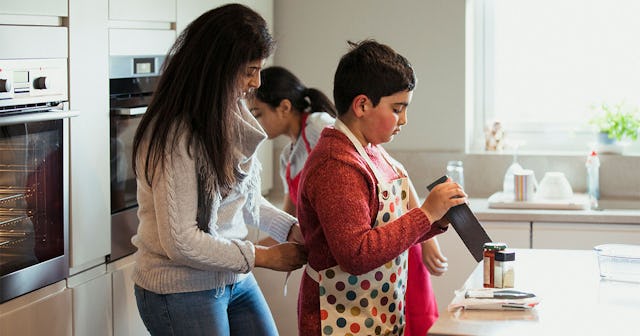Raising A Son With ADHD Made Me Question Everything — But It Gets Better

I was always a good mom, but raising a son with ADHD made me question everything — my child, myself, and our ability to survive the toughest years without blowing sh*t up.
His condition became evident in preschool. When other kids were coloring alphabet letters, my son flipped over a table, pulled a bookshelf to the ground and fled the classroom. His teacher called me in for a meeting and recapped the day’s events. Her face was flushed. She lowered her voice as if a whisper could soften the facts. I don’t recall what she said because all I could hear was the self doubt chanting in my head: You are a terrible mom. A terrible mom. A terrible mom.
When a doctor diagnosed him with ADHD and ODD, it was both a relief and a burden. I was glad to know my son was not the spawn of Satan. The hard part was convincing the rest of the world. When your kid has a developmental impairment, you become a crusader — like it or not.
It’s not your job to educate the world, but it feels like the least you can do.
My bipolar-diagnosed sister says it’s hard to show the world an invisible disorder. The brain is an organ, not a broken bone. You can’t walk around with a cast on your head.
And if it’s tough to convince the world, it’s even harder to keep the peace in the family. ADHD screws with your household.
With two sons at home, the well-behaved one grew increasingly resentful. He saw my stress, my tears, my perpetual frustration as his brother broke every rule and spun out of control. Tasmanian Devil boy. He wondered why I parented his brother differently, why I served him coffee at the breakfast table and sent him to school with a bottle of Mountain Dew. Why the school nurse let him drink it like medicine every afternoon. I’d heard caffeine could help him focus. He was in fourth grade then, and his doctor had prescribed psychotropic drugs. I tried everything to avoid them, eliminated foods with synthetic dyes, fed him fish oil capsules and researched homeopathic approaches. Every Karen I met had an unsolicited opinion. As much as I hoped I’d find the magic bullet, my life was like a Groundhog Day film.
If there was a motherhood handbook somewhere, the language didn’t apply to us. Knowing that comparisons were futile didn’t stop me from watching other mothers — how they managed, maintained, made appointments and showed up on time. I compared their successes with my failures. My son made comparisons too. His older brother was good and he was bad — his internal monologue said so.
Comparisons will crush you.
I wasn’t privy to mommy blogs then. I didn’t know there was a whole wide world of mothers who felt shitty too. Mothers who didn’t make their beds, wake up with a song and a smile or bake three dozen cookies before work and attend PTA meetings on their lunch breaks. There were mothers who dropped F-bombs when they stepped on stray Legos, mothers who made mistakes, forgot to sign school forms, and sometimes drove their kids to school on a Saturday. Oops.
Worry was a muscle that throbbed in my chest. Working full-time and the stress of divorce was often too much. Our morning routine was more like a heavy metal concert, minus the fun. There was shouting, sweating, and a terrible ringing in my ears. I felt guilty all the time, guilty for not having answers, for feeling perpetual frustration, for daydreaming about snatching my kid by the collar and screaming until his little head popped off. I had no idea my feelings were normal, that mothers can love and be enraged too.
Many days, it was hard to remember that my son was wired differently. According to the American Academy of Child and Adolescent Psychiatry, some structures in an ADHD child’s brain can be smaller than those of other children. While the size of those areas has no bearing on intelligence, the delayed development of the frontal lobe can affect problem solving, memory, judgement, impulse control, social behavior, attention span, motivation and more.
My ex-husband said lack of discipline was the problem, and that ADHD was just an excuse, not a chronic condition but a lazy parent’s crutch. To the outside world, picking my battles looked a lot like apathy or parental favoritism. Maybe the latter was true. I chose one son over the other repeatedly. A mom has to rescue the child who’s drowning. How can she not?
In his teen years, hormones and underlying depression kicked my son’s rage into high gear. He stopped going to school, played video games for hours and cursed whenever anyone entered his room. Experts said hate the illness, love the child. But it’s not easy to show love when your kid is punching holes in his bedroom wall and wishing it were your face. Anger was his go-to emotion, but beneath it were layers of sadness, anxiety, fear and even self-loathing.
No matter how destructive he became, the B-word was still off limits. Because when you call a boy “bad,” he’ll prove you right. Criticizing a kid with ADHD reinforces poor behavior and leads to resentment and hostility, says James Greenblatt M.D., author of Finally Focused.
Now 22 and stable, thanks to therapy, medication and exercise, my ADHD son is thriving. Unfortunately, it took many years and many disasters for us to fully understand his condition. I still have moments of doubt about how I mothered my sons. I have to remind myself that ADHD is a neurodevelopmental disorder, and even the experts know it’s a shitstorm. Being a mother doesn’t mean you’re always equipped. But you guess, try, fight, cry and keep going. Sometimes it works out.